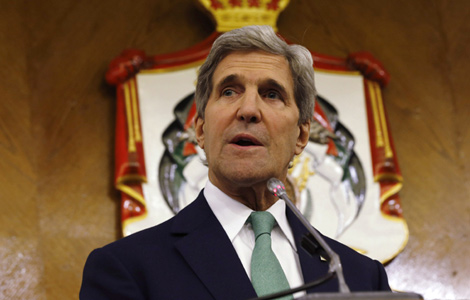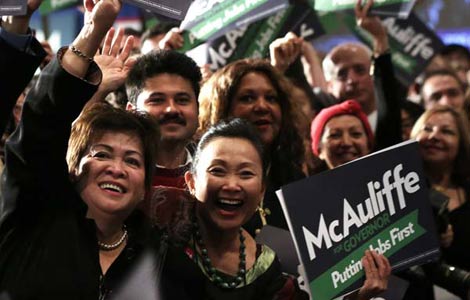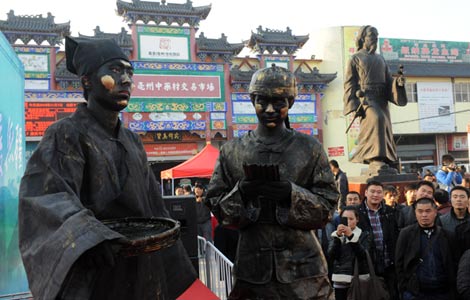Rebalancing puts brake on better relations
Updated: 2013-11-08 08:18
By Chen Weihua (China Daily)
|
||||||||
 The US rebalancing to the Asia-Pacific has unsettled relations with China, and distrust between the two countries has deepened since the United States started relocating its massive military assets to the region.
The US rebalancing to the Asia-Pacific has unsettled relations with China, and distrust between the two countries has deepened since the United States started relocating its massive military assets to the region.
On Tuesday, Admiral Samuel J. Locklear III, commander of the US Pacific Command, said that basing a large portion of the US navy in the Pacific should not be viewed as unusual.
Then on the same day, US Defense Secretary Chuck Hagel vowed that the US will maintain its military supremacy. However, his comment that the Pentagon has not taken the lead in this rebalancing shows that the US has finally realized that its overemphasis on the military component has been unwise.
Robert Ross, a professor of political science at Boston College and an associate at the John King Fairbank Center for Chinese Studies at Harvard University, wrote in Foreign Affairs magazine that the Barack Obama administration's rebalancing is not contributing to stability in Asia, instead it is making the region more tense and a conflict more likely. Military aircraft and naval ships now crowd the region's skies and water. The US risks getting involved in hostilities over islands that are strategically irrelevant and economically marginal to it.
With its unrivaled military might, the US tends to believe that a quick solution to complex problems is simply to display or even use its military muscle. In the minds of some US leaders, relocating 60 percent of the US navy to the Asia-Pacific by 2020 will deter any challenge to the US' self-proclaimed global leadership. In this sense, the military rebalance is intended to intimidate.
The US government has never been honest about its rebalancing, claiming it is not aimed at China, a statement that few, even in the US, believe. Most analysts describe the rebalancing as a move to counter China's growing influence. The US certainly does not need to make such a massive military adjustment for the sake of the Democratic People's Republic of Korea.
The US government has been skillful in claiming the moral high ground, assuming the role of policeman not just in East Asia, but all over the world, and claiming its intention is to maintain peace, security and prosperity for all.
This has been shown to be the lie it is by its spying on imagined foes and real friends alike.
Even worse, the US has repeatedly tried to prove to its allies that the US, regardless of its declining influence, still calls the shots in global and regional affairs.
The US' restrictions on high-tech exports is a reminder why the US has designed such a paranoid rebalancing strategy aimed at China. On a short list of countries US companies are prohibited from exporting to, China is included alongside a few other countries that the US claims sponsor terrorism and proliferate nuclear technology.
Since the two nations' presidents met in Sunnylands, California, this June, there have been signs that relations are warming. Military exchanges, which have long lagged behind other aspects of the bilateral relationship, are said to be improving.
But such efforts won't help much if the US does not fundamentally change its Cold War style thinking embedded in its rebalancing strategy.
The author, based in Washington, is deputy editor of China Daily USA. chenweihua@chinadailyusa.com

 Kerry to join Iran nuclear talks in bid to reach deal
Kerry to join Iran nuclear talks in bid to reach deal
 Politicians court US-Asians amid anti-China sentiment
Politicians court US-Asians amid anti-China sentiment
 Britain remembers war dead
Britain remembers war dead
 Stolen newborn returned to family
Stolen newborn returned to family
 TCM firms should 'learn rules of West'
TCM firms should 'learn rules of West'
 Artists see big picture in CBD's art zone
Artists see big picture in CBD's art zone
 Twitter shares soar 92% in frenzied NYSE debut
Twitter shares soar 92% in frenzied NYSE debut
 Fly with the Jetman
Fly with the Jetman
Most Viewed
Editor's Picks

|

|

|

|

|

|
Today's Top News
China should allow for higher inflation: economist
CIA paying AT&T to provide call records - NYT
Li vows growth, reform balance
Sister cities step up business
Bank exec describes meeting with Li Keqiang
Russian meteor studied for clues to next one
Twitter soar 92% in NYSE debut
Overseas Chinese chase opportunities at home
US Weekly

|

|







